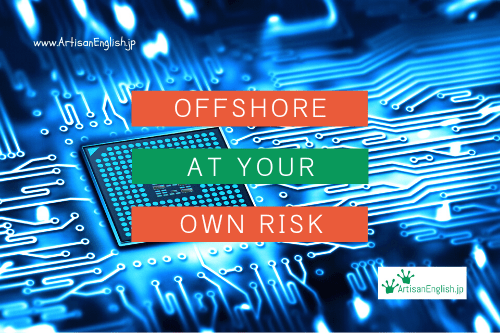
YouTube / iTunes / Spotify / Radio Public / Pocket Casts / Google Podcasts / Breaker / Overcast
Listen to ArtisanEnglish.jp posts & lesson intros here.
Word of the Day: Offshore
We’ve been on a hell of a ride since early 2020, haven’t we?
I think we’ve not only realized the danger of offshoring essential items but become victims of it.
In the name of globalization, the West has offshored the lion’s share of the production of important items.
When something such as manufacturing or the registration of a ship is offshored, it’s made, situated, or registered in a foreign country, especially to take advantage of lower taxes and costs or less stringent regulations.
It worked well for quite a while.
Then the pandemic hit, and after that, Russia invaded Ukraine.
In 2020, if you needed personal protective equipment (PPE), you had to get it from China.
In 2021, if you required microchips for your manufactured items, you had to get them from Taiwan.
Now, in 2022, if you are not energy self-sufficient, you may find your country and economy at the mercy of an energy-rich nation ruled by a tyrannical butcher.
The world, or at least the Western world, has had an epiphany.
From Canada to Japan and all countries in between, national leaders now understand that we need to bring our offshored manufacturing home and build up expertise in various industries on our soil to count on ourselves during an emergency.
Merchant seamen working on foreign-registered vessels are often not paid for their services, as discussed in the lesson ‘Shipping News.’
Essential medications are also often manufactured overseas or contain ingredients that are not produced domestically.
We addressed that way back in 2019 in my lesson titled ‘Generics.’
Offshoring worked to boost our economies, but now it is more of a weakness.
Flesch-Kincaid Readability Test
This post is understandable by someone with at least a 9th-grade education (age 15).
On the Flesch-Kincaid reading-ease test, this post scores 58.
The easier a passage is to read, the higher the score on a scale of 0 – 100.

